
This review may contain spoilers
Ridiculously good to watch with little to no expectation of high, emotionally traumatizing stakes
The headline said it all. No kidding. I loved watching Fight For You because, right from the get-go, the story did not intend to dive into the shady underworld business to keep us on the edge of our seats. I was seated for the main couple, and later episodes featured me sitting for the second couple as well. Hei and Bai rocked my world in the silliest of ways. Their chemistry is everything my eyes crave. When they both cried, my tears filled buckets. Meanwhile, Bu Xing and Zhou Guo had me thanking the writers for dessert. My heart is full. But I will keep coming back to savor the fun, lovable moments shared between Hei and Bai. Argh. I wanted to see their wedding. I guess I'll just imagine it to be black and white. LOL.Was this review helpful to you?

This review may contain spoilers
Short, fluffy, and sweet Highschool to Workplace BL
A gentle workplace-reunion BL that starts off cute but doesn’t quite reach its full emotional potential. While the short format limits deeper character development, the series delivers its fair share of sweet, awkward moments and a nostalgic high school charm—especially in the game-like cutscenes that often outshine the main plot. Chemistry between the leads wavers in adulthood but glows in flashbacks. Bonus points for a heartfelt blog-entry finale, but minus some for emotional shortcuts and missing domestic intimacy. Overall, a light and watchable series—ideal for fans seeking something low-stakes and soft.🔹 Best feature: The pixel-style end scenes and teenage flashbacks
🔹 Vibe: Awkward soft boys learning to love again
Was this review helpful to you?

This review may contain spoilers
A subtle breeze that had me wishing for a whirlwind
I had no expectations. Like the title suggests, a gust of wind can come by with no warning. This breeze has passed me by a few times before I finally took notice of it. When I did, I was met with a quality production for a mediocre plot. It's basic in the sense that I can summarize the story in one sentence: boy meets love, abandons it, then pursues it after a few years of contemplation. There is beauty in simplicity. Every emotion was portrayed and delivered well throughout. I am yearning for more, hence, the wish for a "whirlwind"--a second season perhaps. I found myself rooting for the second lead to find his breeze of love. He deserves it, too. We all do. After watching this, I learned not to take love, in all its forms, for granted. We never know when it will come by.Was this review helpful to you?
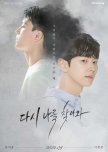
This review may contain spoilers
Crying while writing this...
“If you had the chance to save the person you loved most… would you do it, even if it meant losing them forever?”Once Again is a devastatingly beautiful tale of time, trauma, love, and sacrifice. It begins with a simple premise—a 25-year-old college student, Shin Jae Woo (Moon Ji Yong), returns to an old study dorm 15 years after a traumatic event, only to be transported back to 2007. There, he meets his younger self’s best friend and secret savior, Kang Ji Hoon (Lee Hyun Jun), and is given the rarest of gifts: time. A second chance. A chance to prevent the tragedy that marked his life forever.
But Once Again is not your typical time-travel romance. It’s not about rewriting history—it’s about confronting pain, understanding loss, and accepting love in its purest and most bittersweet form.
The performances?
Moon Ji Yong was hauntingly restrained, portraying Jae Woo’s quiet desperation and fragile hope with so much depth it ached. Lee Hyun Jun, on the other hand, shone with a radiant warmth that made Ji Hoon the kind of character you’d mourn forever. Their chemistry was subtle, soulful, and gut-wrenchingly real.
The story?
Cleverly written and emotionally raw. It doesn’t shy away from the darkness of trauma, nor the cruelty of fate. And yet, it still gives us moments of light—of shared glances, quiet comforts, and the type of love that lingers long after the credits roll.
The production?
Visually stunning with soft, melancholic color grading that mirrors the emotional atmosphere. The writing was tight, each episode layered with symbols, and that OST?? It rips your heart out gently like a 2000s heartbreak anthem you didn’t know you needed.
“Let’s meet again. 15 years later… another 15 years later.”
—Ji Hoon (and us, crying)
Overall rating: 9.0/10
This is not just a love story. It’s a story about healing, letting go, and finding peace—even if it’s only through tears. Highly recommended if you want something soul-crushing and unforgettable.
Was this review helpful to you?

This review may contain spoilers
A review on my first Chinese BL
Blue Canvas of Youthful Days is a 12-episode Chinese BL series that follows the tender, turbulent, and transformative journey of two young artists navigating love, ambition, and personal healing. Going into this series, I wasn’t sure what to expect. I thought it might bore me. But to my surprise—it absolutely did not. In fact, it moved me in ways I didn’t anticipate.The story revolves around Qi Lu, a gifted painter pressured by an abusive father obsessed with fame, and Qin Xiao, a quiet yet passionate sketch artist with dreams of teaching art to children. Their paths cross at Biyo Arts Academy, where they grow from strangers to friends and, eventually, to something much deeper.
Early on, the pacing was steady and promising. However, around Episodes 9 to 12, the narrative began to feel rushed and slightly disconnected. Personally, I felt Episode 8 wrapped up the main emotional arc so satisfyingly that what came after felt like bonus content—sometimes engaging, sometimes unnecessarily dramatic.
The main relationship is the heart of the series. Qi Lu’s bold charm and emotional honesty perfectly complement Qin Xiao’s quiet intensity and focus. Their chemistry is undeniable, and watching their bond evolve was one of the most rewarding aspects of the show. While their journey isn’t without bumps—including moments that felt emotionally heavy or unfair—the way their relationship develops remains sincere and heartfelt.
One aspect that didn’t sit well with me was a particular misunderstanding that painted one character in an unnecessarily negative light. Although it was later addressed, it felt glossed over too quickly. Still, the emotional growth and affection in later episodes helped restore the connection between the leads.
The finale, though, left me with mixed feelings. It introduced one last conflict that felt too sudden and slightly contrived, especially when the story had already hit so many emotional high points. A significant time skip is used as a narrative tool to resolve lingering tension, and while it wasn’t executed perfectly, it gave the story a hopeful, if understated, conclusion.
As for the secondary couple, Liu Ming Yang and Tan Yin, their story provided a gentle contrast to the main romance. While their presence was meaningful to the plot's broader themes of mentorship and acceptance, I personally found their scenes less compelling compared to Qi Lu and Qin Xiao’s journey. That said, viewers who enjoy slow-burn romances and representation of differently-abled characters may appreciate their arc more than I did.
Despite its flaws, Blue Canvas of Youthful Days offered a touching portrayal of young love, self-discovery, and the courage to pursue what you love, no matter the cost. The final moments—simple yet resonant—left a lasting impression.
“In the future, you must do what you love.”
A fitting reminder from a series that, at its core, is about following your passion and protecting your heart.
Was this review helpful to you?

This review may contain spoilers
Jazz for Two — A Bittersweet Duet of Music, Youth, and Healing
A Short Review by a Viewer Who Felt Every NoteJazz for Two is a South Korean BL youth drama that follows the intertwining lives of four students brought together by music, grief, and growing love. At the heart of the story are Seheon, a quiet pianist burdened by the past, and Taeyi, a brash yet emotionally complex student still haunted by the loss of his older brother, Taejun. Their bond—first formed in an old, nearly-forgotten piano room—sets the tone for a series that tries to hit both tender and tragic notes.
The show starts strong with its musical foundation. Each original composition feels intentional, heartfelt, and representative of the characters' emotions. From melancholic solos to the high-energy festival performance, Jazz for Two treats music as more than a backdrop—it's an emotional language. That final number, blending modern jazz with friendship and healing, is a genuine highlight.
Character-wise, the show shines most through its secondary pairing: Juha and Doyoon. Their reconciliation arc is touching, well-paced, and sprinkled with humor and tenderness. Meanwhile, Taeyi and Seheon’s relationship—though central—suffers from uneven pacing. The apology and romantic resolution felt rushed and emotionally undercooked, despite some powerful individual moments.
Plot-wise, the twist involving the older brothers, Sejin and Taejun, added depth but was introduced too late and handled with too little clarity to fully land. Seheon’s guilt and resulting breakup with Taeyi felt manufactured, which slightly undercut the sincerity of their reconciliation.
Visually, the series maintains a warm, soft aesthetic that complements the emotional beats. The old piano room, jazz bar, and classroom scenes all carry a cozy, lived-in atmosphere. Paired with solid sound design, the production supports the story well, even when the writing occasionally falters.
In the end, Jazz for Two concludes like a true jazz piece—imperfect, improvisational, but filled with soul. It may stumble in rhythm, but it ends with a sense of hope, connection, and healing. If you love character-driven stories, emotional musical performances, and themes of youth and redemption, this one’s worth the watch—at least once.
Best enjoyed with your heart open and expectations managed.
Was this review helpful to you?

This review may contain spoilers
“The Eighth Sense” — A Love That Drowns You, Then Teaches You to Swim
𝗥𝗲𝗳𝗹𝗲𝗰𝘁𝗶𝘃𝗲 𝗖𝗼𝗺𝗺𝗲𝗻𝘁𝗮𝗿𝘆 𝗯𝘆 𝗠𝗮𝘁𝘁I thought I was signing up for a gentle, slow-burn romance between two university students. What I didn’t expect was a raw, soul-shaking dive into grief, mental health, unspoken pain, and a love that doesn’t always come wrapped in clarity—but in courage.
𝐓𝐡𝐞 𝐎𝐜𝐞𝐚𝐧 𝐁𝐞𝐭𝐰𝐞𝐞𝐧 𝐓𝐡𝐞𝐦
The sea was never just scenery—it was the story. In it, Jaewon and Jihyun found comfort, thrill, and ultimately, tragedy. The same waves that brought them closer also tried to pull one of them away. The ocean, like their emotions, was deep, untamed, and mercilessly honest. And when Jihyun almost drowned, so did my heart.
𝐉𝐚𝐞𝐰𝐨𝐧: 𝐃𝐢𝐬𝐭𝐚𝐧𝐭, 𝐘𝐞𝐭 𝐃𝐫𝐨𝐰𝐧𝐢𝐧𝐠
Jaewon was not your usual BL lead. He was messy, broken, unsure. His silence screamed. His guilt was so heavy, I felt it through the screen. But instead of romanticizing his trauma, the show let him sit with it. And through therapy, breakdowns, and grief, we saw him trying—slowly, painfully—to live again.
𝐉𝐢𝐡𝐲𝐮𝐧: 𝐆𝐞𝐧𝐭𝐥𝐞 𝐛𝐮𝐭 𝐔𝐧𝐚𝐟𝐫𝐚𝐢𝐝
From countryside boy to resilient survivor, Jihyun’s journey was quieter, but just as powerful. He didn’t just fall in love; he chose to love—even when it hurt. His tenderness, his courage to return to the person who almost lost him, was the kind of strength we rarely get to see portrayed in male leads.
𝐓𝐡𝐞 𝐖𝐞𝐢𝐠𝐡𝐭 𝐨𝐟 𝐔𝐧𝐬𝐚𝐢𝐝 𝐖𝐨𝐫𝐝𝐬
What struck me most wasn’t the kisses, the gazes, or the tension-filled moments (though YES to all of that). It was the silences. The fear of saying too much. The pain of saying nothing at all. “The Eighth Sense” made space for the unspoken, the awkward, the unresolved. It was beautifully, brutally human.
𝐇𝐞𝐚𝐥𝐢𝐧𝐠 𝐓𝐡𝐚𝐭 𝐃𝐨𝐞𝐬𝐧’𝐭 𝐓𝐢𝐞 𝐈𝐭𝐬𝐞𝐥𝐟 𝐍𝐞𝐚𝐭𝐥𝐲
There’s no “happily ever after” here—just two people, scarred but still choosing each other. The show doesn’t lie to you: trauma doesn’t vanish, and love doesn’t fix everything. But it can hold your hand through the darkness. And sometimes, that’s enough.
𝗙𝗶𝗻𝗮𝗹 𝗧𝗵𝗼𝘂𝗴𝗵𝘁𝘀
The Eighth Sense didn’t ask to be perfect. It asked to be honest. It took its time showing us that grief and healing can coexist. That pain can sit next to love. And that sometimes, the bravest thing isn’t running toward the light—it’s staying when you want to disappear.
𝘛𝘩𝘪𝘴 𝘪𝘴𝘯’𝘵 𝘢 𝘴𝘵𝘰𝘳𝘺 𝘐’𝘭𝘭 𝘦𝘢𝘴𝘪𝘭𝘺 𝘧𝘰𝘳𝘨𝘦𝘵. 𝘐𝘵 𝘮𝘢𝘥𝘦 𝘮𝘦 𝘧𝘦𝘦𝘭 𝘴𝘦𝘦𝘯, 𝘴𝘩𝘢𝘵𝘵𝘦𝘳𝘦𝘥, 𝘢𝘯𝘥 𝘴𝘵𝘪𝘵𝘤𝘩𝘦𝘥 𝘣𝘢𝘤𝘬 𝘵𝘰𝘨𝘦𝘵𝘩𝘦𝘳—𝘢𝘭𝘭 𝘢𝘵 𝘰𝘯𝘤𝘦.
Was this review helpful to you?

Drag Race Philippines: Slaysian Royale
0 people found this review helpful
This review may contain spoilers
Learning is the New Winning!
My favorite line from our first-ever Slaysian Royale Drag Superstar, Brigiding. When I watched Episode 1, I already felt her burning desire to slay the house down boots. The brightest star consistently showed up and lit the runway. Brigiding truly embodied the essence of a Slaysian Royale Drag Superstar.Beyond the charisma, uniqueness, nerve, and talent, she is authentic, empathetic, and endlessly inspiring. Her journey throughout the competition wasn’t just about proving she could win—it was about growth, resilience, and rediscovering joy in her craft. Every episode showed a new layer of vulnerability and strength that made her crowning moment feel deeply earned.
The finale itself was a celebration of Asian drag excellence: glitz, heart, and storytelling in one unforgettable spectacle. Each finalist brought something powerful to the stage, but Brigiding reminded us that sometimes, the true victory lies not in perfection, but in transformation.
Learning is the new winning, indeed. 🌈👑
Was this review helpful to you?

A sweet, short review for a simple, light series
Eye-catching visuals? Check.Fun, youthful dynamics? Check.
A side of drama that's just for character development? Check.
Love Tractor ensured that I would gradually fall in love with everything it had to offer. A golden retriever, younger, yet bulkier lead who fell first, AND a cat-like, older, smaller lead who fell harder? SIGN ME UP. I will watch this again, and again, and again, and I know I won't get tired. That's how much I adore this series. I LOVE Love Tractor.
Was this review helpful to you?
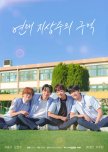
This review may contain spoilers
I laughed. I cried. I rebooted my own worldview.
“I finally realized that every answer I had hoped for was in everyday life that was too mundane to be ‘fate,’ yet too beautiful to be ‘chance.’”That line? That line ended me. And healed me. And made me press replay.
“Love for Love’s Sake” is not just a KBL series—it’s a full-on emotional simulation, disguised as fluff, and coded with heartbreak, healing, and game mechanics so existentially metaphorical that I nearly filed an emotional bug report to the universe.
I went in expecting a sweet story. What I got instead? A ticking time bomb of 300 days, a sunbae who just wanted someone to stay, and a puppy-eyed idol who said, “I got you, sunbae”—and meant it.
💔 The Game That Played Me
The setup is simple: Myungha is given a mission by the "game" to make Cha Yeowoon happy. He’s given stats, quests, penalties, buffs—and a limited number of days. But what begins as a lighthearted simulation quickly spirals into something much deeper. The game is a metaphor—life itself, the choices we make, the timelines we abandon, the people we try to save even when we’re falling apart.
🧠 Character Growth: LEVEL 999
The emotional evolution of both Myungha and Yeowoon was painfully exquisite. Myungha, a man weighed down by rejection, abandonment, and self-loathing, tried to play the game right even as it glitched beneath his feet. And Yeowoon? Our precious idol boy grew into a man who no longer just wanted to be loved—he chose to love back, actively, bravely.
Their arcs are where this story wins—because every change is earned. Every breakdown feels real. Every tiny moment? A puzzle piece in a love story coded not by fate, but by choice.
🔧 Plot & Pacing: Nearly Perfect, with One Final Glitch
Episodes 1-7 had god-tier pacing. Cliffhangers hit hard, emotional beats landed perfectly, and the stakes kept rising.
But the finale? While satisfying emotionally, it introduced a time difference twist that—though symbolic—slightly disrupted the momentum. I didn't need that temporal hiccup to feel the reunion. The emotional weight was already there.
Still, the reunion? Kisses. Tears. The fluff we earned. Worth it.
🎮 Game Mechanics: Metaphorical and Meaningful
I didn’t understand every stat, every timer, or every rule—but honestly? That felt intentional. Like life, the “game” wasn’t always fair or clear. But it forced Myungha—and us—to confront whether love is about fulfilling missions or about choosing someone again and again, even when it hurts.
And once the game ended? What remained was real life. The kind filled with beaches, ice cream, found family, and days that feel mundane… but are actually magical.
✨ Final Verdict:
“Love for Love’s Sake” is for the story-driven romanticists, the emotional masochists, the believers in redemption arcs, and anyone who’s ever felt like a glitch in someone else’s game. It’s beautiful, bold, bittersweet—and it rewards the viewer who watches with heart.
I laughed. I cried. I rebooted my own worldview.
9.8/10. Only deducted 0.2 for the finale's slight pacing hiccup, but emotionally? It's a 12/10.
Watch it. Then watch it again. And maybe fall in love—for love’s sake.
Was this review helpful to you?
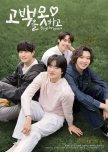
This review may contain spoilers
DO NOT LET THE COMEDY TAG FOOL YOU!
I watched Boys Be Brave thinking I’d get a cute, lighthearted BL story, but what I got was something far more tender, truthful, and transformative. This little 8-episode gem, barely 30 minutes per ep, managed to say what some longer series struggle to express: the beauty of choosing yourself, and then choosing love.✨ Ki Sub’s growth arc was everything.
From being someone who kept chasing external definitions of success and identity, to someone who stood still and said, “This is what I want. And I’m allowed to want it.” He became an anchor—not just to Jin Woo, but to himself. He made me believe that stillness is not stagnation. It’s strength.
🧸 Jin Woo was the quiet light of the show.
He didn’t need to be loud or perfect—just genuine. Every time he said something simple like “I want to laugh every day” or “I hope Ki Sub stays healthy,” it hit deeper than any grand declaration. Because it was real. And isn’t that the kind of love we all crave?
💔 And don’t get me started on Balgeum and In Ho—the slow-burn second leads who nearly stole the spotlight. Their pain, their awkwardness, their yearning… it all felt so honest. That one final conversation? No dramatics. Just respect, space, and a promise for the future. I was FLOORED.
🎇 The ending didn’t go for a dramatic twist.
It went for peace.
A kiss at midnight. A whispered wish. A snowfall promise. And honestly, that’s perfect. It leaves you full, yet wanting just a little more. Because life’s like that too.
Was this review helpful to you?
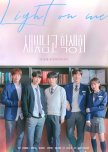
This review may contain spoilers
Finally Wrote a Review for My Top 1 K-BL Series
Tags: Boys’ Love, Coming of Age, High School, First Love, Found Family, Healthy Relationships, Slow BurnLight On Me is a gentle yet emotionally resonant gem in the Boys’ Love genre—a series that proves that soft, quiet storytelling can be just as gripping and satisfying as any grand drama. Adapted from the popular mobile game “Saebit Boys’ High School Council,” this drama takes its time building a world where relationships bloom through awkward encounters, heartfelt conversations, and quiet moments of longing.
What makes Light On Me shine isn’t just the romance—it’s the sincerity in how every character is written and portrayed.
Characters & Acting:
Lee Sae On’s portrayal of Woo Tae Kyung is incredibly endearing. Watching his journey from a shy, emotionally guarded teen into someone who expresses and receives love so freely is deeply rewarding. Kang Yoo Seok as Noh Shin Woo absolutely nails the quiet pining and tender awkwardness. His small expressions—hesitation, soft smiles, the infamous red ears—made my heart flutter countless times. Ko Woo Jin’s Namgoong Shi Woon brings levity and wisdom, while Choe Chan Yi’s Shin Da On presents a nuanced take on perfection and emotional restraint. Yang Seo Hyun as Lee So Hee epitomizes eloquent character development. And of course, Lee Ki Hyun as Mr. Seo Haet Bit—possibly the best accidental wingman in K-BL history.
Romance:
The slow burn between Shin Woo and Tae Kyung is so well-paced that when they finally come together, it feels earned. From misunderstandings to silent glances, every milestone in their relationship is layered with meaning. That final episode? Emotional payoff at its finest. Their banters, soft confessions, hand-holding, and kisses—all executed with warmth, care, and realism.
Themes:
Beyond the romance, Light On Me excels in its depiction of identity, friendship, and acceptance. It tackles self-discovery, emotional maturity, and queerness with grace, never reducing characters to stereotypes. The friendship among the student council members evolves beautifully, reminding viewers of how healing and joy can be found in chosen family.
Cinematography & Aesthetics:
Visually, the drama is pastel-toned and serene, with lighting that often mirrors the characters’ emotional states. There’s a poetic softness in the way scenes are shot, especially moments of stillness, like the fireworks scene or quiet walks in the park.
Final Thoughts:
Light On Me isn’t just a romance. It’s a celebration of sincerity, of quiet bravery, of first love that doesn’t demand to be loud to be felt. It was never about “if” Tae Kyung and Shin Woo would end up together—but how. And their “how” was full of gentle longing, mutual growth, and a beautiful unfolding of hearts. A must-watch for anyone craving BL done right—with intention, care, and glowing heart.
Was this review helpful to you?
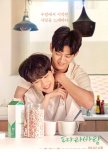
A short, heartfelt review for a simple, soulful series
Like a quiet melody that blooms into a heartfelt ballad, Sing My Crush brought me on a journey that wasn’t about spectacle, but soul. It sang about friendship, missteps, growth, and the courage to dream out loud — and it did so with warmth, vulnerability, and charm.Despite the brief runtime, every episode felt like a handwritten letter, reminding me that not all stories need to shout to be heard. Sometimes, all it takes is a gentle voice, a clear heart, and a love that listens.
Sure, it wasn’t a flawless score — but perfection was never the point. Sing My Crush was simple, sincere, and unafraid to hold space for emotional honesty. And that, for me, made it a standout symphony in a sea of noise.
🎵 A show I’ll revisit when I need something soft yet strong — like a hug wrapped in a love song. 💙
Was this review helpful to you?
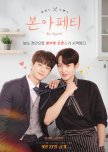
This review may contain spoilers
Bon Appétit: A Review Worth Savoring
I just finished Bon Appétit, and let me tell you—I’ve never felt so full in all the right ways. This cozy, slice-of-life KBL isn’t just a love story; it’s a delicately plated course of comfort, conflict, healing, and heart. From the first bite to the last, this series offers a slow-burn romance that simmers with chemistry and affection, seasoned with the everyday sweetness of shared meals and quiet moments.✨ Plot Summary
Dohoon, an advertising professional leading a routine life, meets Yoonsoo—his new neighbor and a passionate cook—through a small act of kindness: a gifted fermented drink that ends up inspiring a whole campaign. What starts as neighborly dinners turns into a rekindled connection—Yoonsoo was actually Dohoon's junior in college, who had, in many ways, indirectly confessed his feelings and then vanished. Seven years later, their lives intertwine once more, this time over heartfelt meals and second chances.
🍱 The Flavor Palette
Each episode is like a new dish—familiar, comforting, and full of meaning. From humorous misunderstandings to tender confessions, the show builds a satisfying rhythm. Dohoon’s emotional growth is beautifully juxtaposed with Yoonsoo’s quiet vulnerability. Their chemistry? Overflowing. And the food metaphors? Chef’s kiss.
🔥 Episode Highlights
Episode 6 masterfully clears the air with emotional clarity and graceful pacing.
Episode 7 brings the tension: Yoonsoo’s ex resurfaces, but boundaries are drawn with maturity.
Episode 8? The final course. Dohoon’s burnt s’more cookie turned “smooth cookie” is the perfect symbol of their imperfect, but heartfelt love.
💔 Critique: The Underseasoned Ingredient
If there’s one thing missing, it’s Yoonsoo’s ex, Minjoo. We’re teased with his presence, but we never get the full recipe—no details about what broke them up, no insight into why Yoonsoo still carried so much resentment. A deeper exploration would’ve added spice and depth to Yoonsoo’s character.
🌟 Best Lines
Yoonsoo: “The beauty about food is, there isn't a fixed recipe. So, food is similar to life... Although it's not a s’more cookie, it birthed a smooth cookie, containing our emotions, so I really like it.”
Dohoon: “Yesterday, I didn’t eat the kimbap that my beloved made for me... Even if it’s a common kimbap, I should thank him for his hard work and be polite to him. But I didn’t... Now that you’re against me, I realize how mean I was.”
💫 Final Verdict
Bon Appétit is wholesome, heartfelt, and genuinely moving. It’s a meal you don’t rush—it invites you to linger, taste, and reflect. While a second season or a prequel could help bring out more of Yoonsoo’s backstory, this dish, as it stands, is rich with sincerity and warmth.
Recommended for: fans of soft romances, food metaphors, mature conflicts, and healing narratives.
Pairs well with: warm tea, cozy blankets, and maybe a kimbap or two.
Was this review helpful to you?

This review may contain spoilers
Cute fluff non-problematic realness
This is a prime example of a simple plot executed in perfection with a charming, irresistible cast. They did amazing. The only thing I dislike about this series is its brevity. I want more fluffy episodes. Also, I'm happy they didn't dive deep into the potential scandal shiz. That reporter really had no business being so nosy. I'll surely rewatch most episodes because Na Aejoon and Choi Siyeol are such a delight when they're together.Was this review helpful to you?
























